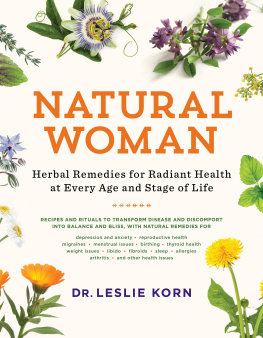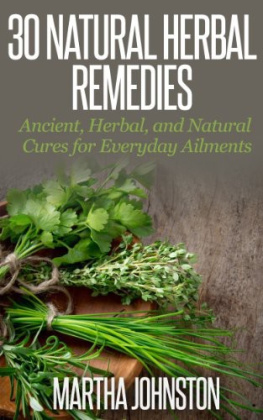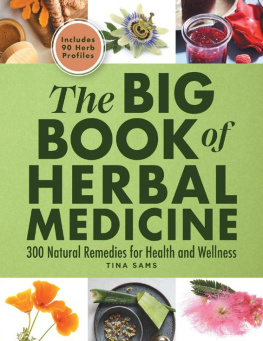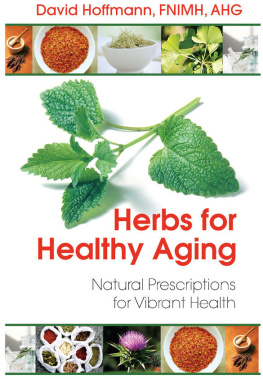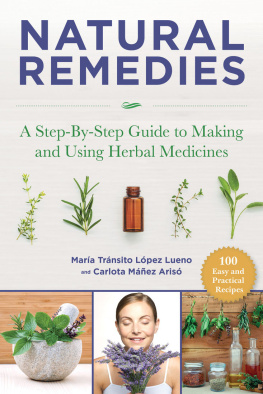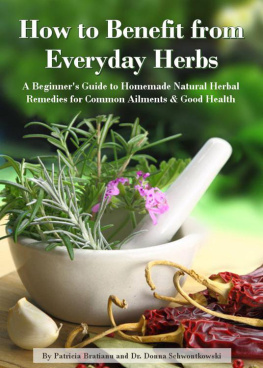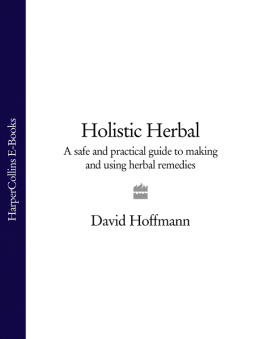In memory of my teacher, herbalist Michael Moore
Acknowledgments
No herbalist comes into the world knowing everything there is to know about plant medicine. We learn from one another. We learn from experience. We learn from the plants. Im incredibly grateful to the many people who influenced my study and helped bring this book together.
Herbalist Michael Moore, with whom I studied at the Southwest School of Botanical Medicine, remains my most influential teacher. He opened my eyes to the body systems and made me realize how utterly fascinating the nexus of herbal medicine and the human body can be. Although I have learned remedy-making techniques from many other herbalists, Michaels unique techniques remain my favorite and can be found in this book. Though we lost this herbal icon in 2009, his profound contributions to the herbal community live on through his books, course, wife, and students.
To round out my education, Im grateful to many other herbal teachers: Rosemary Gladstar is not only a wonderful herbalist but also probably the most inspiring human being I have ever met. Nancy and Michael Phillips introduced me to the way of living herbs. Christine Tolf taught me to look beyond the more chemical aspect of herbs and work with flower essences. Other people who greatly influenced my approach to herbs through reading their work and interviewing them for articles include Mary Bove, Rosalee de la Foret, James Duke, Henriette Kress, Greg Marley, Rob McCaleb, Jim McDonald, Joe Pizzorno, Aviva Romm, Kiva Rose, Julie Bruton-Seal, Sharol Tilgner, and Maia Toll. My work at Natural Health Magazine, Herb Quarterly , and Remedies Magazine , along with teaching classes, seeing clients, and working the supplement aisles of various natural food stores, has provided constant exposure to other peoples stories what has worked for them and what has not. Im always listening and taking notes, and I thank all those people who have taken the time to share their experiences with me.
In my life, Im grateful for the loving support of my parents, my grandparents, and my husband. I must admit that Shannon was a little anxious to have his wife quit her day job after our honeymoon to be a full-time herbalist, but we made it happen! I also thank everyone who kept asking when I would write a book, especially Susanna Hargreaves, who finally made it click and helped ignite my vision and drive for these pages. Thank you, too, to friends and colleagues Mimi Alberu (the animal herbalist), Dr. Cora Rivard (the naturopath), and Tiffany Coroka (my first-pass editor) for their invaluable input on my manuscript.
Lastly, my deepest gratitude to the team at Storey, without whom this book wouldnt be possible: Deborah Balmuth, Nancy Ringer, Michaela Jebb, Kimberly Peck, and Sarah Armour. Thank you for believing in me and bringing the book into being.
Contents
Introduction: Achieving a Natural Balance
Good health grows in nature. Its really that simple.
We thrive in nature. We feel better, we feel healthier, when we rely on real food, spend plenty of time outdoors, bring the elements of nature into our daily life, and use herbs as our primary form of medicine. Many of the common ailments and diseases we see in modern society stem from the fact that we have shifted away from our primal connection to nature. Health and disease in the body interact in fascinating interconnected patterns, and when we make use of our connection to nature employing herbs and natural therapies we can shift those patterns to bring the body into greater balance and vitality. Plants heal. Nature heals.
Whether you have a multitude of serious diseases or youre relatively healthy with just a couple of minor complaints, your symptoms are not something to overcome. Instead, theyre your bodys way of telling you that something is out of balance. These symptoms are your taskmasters that is, the alarm system for your body and clues about the underlying imbalance. This book will teach you how to listen to your body. It may take some detective work and a multifaceted healing approach, but its worth it. The earlier you recognize your bodys distress signals, the easier it will be to heal disease naturally. But no matter where you are in your health, you can make improvements with herbs and holistic therapies.
Americans are gradually realizing that our current allopathic medical system its approach and its medicines often makes us sicker (not to mention broke) in the long run. In this profit-driven system, we spend more on health care than any other nation, yet we come in at a dismal number 38 worldwide for our actual health and well-being. Doctors rely heavily on an arsenal of pharmaceuticals, but side effects from these strong drugs kill more than 100,000 Americans annually. Even if you survive the treatment, youll often experience a slew of serious side effects. With this myopic approach to treating symptoms, the body continues to scream for help, and new issues (backup alarms) sound off. Side effects build. You might be taking a handful of pills each day, but you still dont feel well .
Enter herbal and natural medicine.
Natural therapies are generally less expensive, significantly safer, better suited to self-care, and more holistic than allopathic medicine, and they have a host of side benefits . In fact, just one herb can contain hundreds of compounds that work together in synergy to address a range of health conditions. So that hawthorn youre taking for blood pressure may ultimately also improve your mental clarity, energy levels, and mood.
Whats really fascinating is how they do this. Herbs rarely force the body in a particular direction or supply a single isolated compound with a specific effect on the body. Instead, herbs encourage your body to heal and balance itself. For example, the reproductive herb vitex doesnt contain progesterone; instead, it encourages your brain and ovaries to produce healthier levels of this hormone over time. Most immune-system herbs dont act directly as antibiotics or antivirals; they fortify your bodys natural immune response so that white blood cells and disease-fighting mechanisms work better. Whats more, many herbs have a modulating effect on the body, not a one-way action. For example, astragalus and medicinal mushrooms (fungi are honorary herbs in this book) balance over- and underactive immune systems. Modest doses of eleuthero raise low blood pressure or reduce high blood pressure, depending on whats needed. Holy basil and other adaptogenic herbs amp up or turn down the production of stress hormones, like cortisol, as needed. Its really quite amazing.
Dont think of herbs as mere substitutes for drugs. Herbs act like training wheels to help your body relearn patterns of health, breaking away from patterns of disease and improving day-to-day functioning. For this reason, this book is not an A-to-Z list of helpful herbs. I want you to understand


